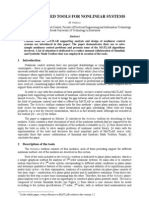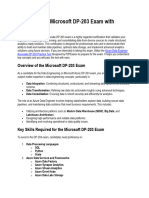0 ratings0% found this document useful (0 votes)
12 viewsSystem Identification and Adaptive Control
System Identification and Adaptive Control
Uploaded by
Subhasish MahapatraCopyright:
© All Rights Reserved
Available Formats
Download as PDF, TXT or read online from Scribd
System Identification and Adaptive Control
System Identification and Adaptive Control
Uploaded by
Subhasish Mahapatra0 ratings0% found this document useful (0 votes)
12 views2 pagesCopyright
© © All Rights Reserved
Available Formats
PDF, TXT or read online from Scribd
Share this document
Did you find this document useful?
Is this content inappropriate?
Copyright:
© All Rights Reserved
Available Formats
Download as PDF, TXT or read online from Scribd
Download as pdf or txt
0 ratings0% found this document useful (0 votes)
12 views2 pagesSystem Identification and Adaptive Control
System Identification and Adaptive Control
Uploaded by
Subhasish MahapatraCopyright:
© All Rights Reserved
Available Formats
Download as PDF, TXT or read online from Scribd
Download as pdf or txt
You are on page 1of 2
Course Title: System Identification and Adaptive Control TPC 4 0 4
The objectives of this course are
1. To give an overview on the different data driven identification methods
2. To make the student understand the principles of relay based identification
3. To enable the student to select a suitable model for identification
4. To elaborate the concept of estimating the parameters of the selected
Objectives: models using parameter estimation algorithm
5. To impart knowledge on how to recursively estimate the parameters of
discrete input –output models (ARX/ARMAX etc) using recursive parameter
estimation methods
6. To make the student understand the principles of STR, MRAC and Gain
scheduling.
• Ability to develop various models from the experimental data
• Will be able to select a suitable model and parameter estimation algorithm
for the identification of systems
Expected
Outcome: • Will be able to carry out the verification and validation of identified model
• Will be able to design simple adaptive controllers for linear systems.
• Ability to identify, formulate, analyse the implementation of adaptive
controllers to the engineering problems.
Module No. 1 Introduction 9 Hours
Introduction and overview of Systems Identification, Adaptive Control and applications. System
Identification-motivation and overview - Non-parametric methods: Impulse response, step response
and Frequency response methods, correlation and spectral analysis methods.
Module No. 2 Parameter Estimation Methods 9 Hours
Parametric model structures-ARX, ARMAX, OE, BJ models - Linear regression - Least square estimates,
statistical properties of LS Estimates. Weighted least squares, maximum likelihood estimation,
Prediction error methods, Instrumental variable methods, Recursive Least squares method- Exercises
using system identification toolbox.
Module No. 3 Relay Feedback and Closed Loop Identification 12 Hours
A generalized relay feedback identification method – model; structure selection- relay feedback
identification of stable processes: FOPDT and SOPDT model. Relay feedback Identification of unstable
processes: FOPDT and SOPDT model. Illustrative examples. Identification of systems operating in closed
loop: Identifiability considerations – direct identification – indirect identification
Module No. 4 Gain Scheduling 9 Hours
Introduction- The principle - Design of gain scheduling controllers- Nonlinear transformations -
application of gain scheduling - Auto-tuning techniques: Methods based on Relay feedback.
Module No. 5 Deterministic, Stochastic and Predictive Self-Tuning 12 Hours
Regulators
Introduction- Pole Placement design - Indirect Self-tuning regulators - direct self-tuning regulators –
Disturbances with known characteristics.
Introduction – Design of minimum variance controller - Design of moving average controller - stochastic
self-tuning regulators.
Module No. 6 Model – Reference Adaptive Systems 9 Hours
Introduction- MIT rule – Determination of adaptation gain - Lyapunov theory –Design of MRAS using
Lyapunov theory – Relations between MRAS and STR.
Text Books
1. K. J. Astrom and B. Wittenmark, Adaptive Control, Addison - Pearson, 2006.
2. L. Ljung, System Identificaiton: Theory for the user, Prentice -Hall, 2007.
Reference Books
1. T. Soderstorm and Petre Stoica, “System Identification”, Prentice Hall International(UK) Ltd.,
1989.
2. K.S. Narendra and A.M. Annaswamy, Stable Adaptive Systems,, Prentice-Hall, 1989.
3. Miroslav Krsti, Ioannis Kanellakopoulos, and Petar V. Kokotovic, Nonlinear and Adaptive Control
Design, Wiley-Interscience, 1995
Dr. Umakanta Nanda Dr. P. K. Ray Dr. Subhasish Mahapatra
(Convenor) Member (External) Member (& Guide)
Dr. Praveen Kumar Dr. Arvind Kumar Prajapati
Member (Internal) Member (Internal)
You might also like
- The Subtle Art of Not Giving a F*ck: A Counterintuitive Approach to Living a Good LifeFrom EverandThe Subtle Art of Not Giving a F*ck: A Counterintuitive Approach to Living a Good LifeRating: 4 out of 5 stars4/5 (6018)
- The Gifts of Imperfection: Let Go of Who You Think You're Supposed to Be and Embrace Who You AreFrom EverandThe Gifts of Imperfection: Let Go of Who You Think You're Supposed to Be and Embrace Who You AreRating: 4 out of 5 stars4/5 (1113)
- Never Split the Difference: Negotiating As If Your Life Depended On ItFrom EverandNever Split the Difference: Negotiating As If Your Life Depended On ItRating: 4.5 out of 5 stars4.5/5 (909)
- Hidden Figures: The American Dream and the Untold Story of the Black Women Mathematicians Who Helped Win the Space RaceFrom EverandHidden Figures: The American Dream and the Untold Story of the Black Women Mathematicians Who Helped Win the Space RaceRating: 4 out of 5 stars4/5 (937)
- Grit: The Power of Passion and PerseveranceFrom EverandGrit: The Power of Passion and PerseveranceRating: 4 out of 5 stars4/5 (619)
- Shoe Dog: A Memoir by the Creator of NikeFrom EverandShoe Dog: A Memoir by the Creator of NikeRating: 4.5 out of 5 stars4.5/5 (546)
- The Hard Thing About Hard Things: Building a Business When There Are No Easy AnswersFrom EverandThe Hard Thing About Hard Things: Building a Business When There Are No Easy AnswersRating: 4.5 out of 5 stars4.5/5 (358)
- Her Body and Other Parties: StoriesFrom EverandHer Body and Other Parties: StoriesRating: 4 out of 5 stars4/5 (831)
- Elon Musk: Tesla, SpaceX, and the Quest for a Fantastic FutureFrom EverandElon Musk: Tesla, SpaceX, and the Quest for a Fantastic FutureRating: 4.5 out of 5 stars4.5/5 (479)
- The Emperor of All Maladies: A Biography of CancerFrom EverandThe Emperor of All Maladies: A Biography of CancerRating: 4.5 out of 5 stars4.5/5 (275)
- The Little Book of Hygge: Danish Secrets to Happy LivingFrom EverandThe Little Book of Hygge: Danish Secrets to Happy LivingRating: 3.5 out of 5 stars3.5/5 (434)
- The World Is Flat 3.0: A Brief History of the Twenty-first CenturyFrom EverandThe World Is Flat 3.0: A Brief History of the Twenty-first CenturyRating: 3.5 out of 5 stars3.5/5 (2281)
- The Yellow House: A Memoir (2019 National Book Award Winner)From EverandThe Yellow House: A Memoir (2019 National Book Award Winner)Rating: 4 out of 5 stars4/5 (99)
- The Sympathizer: A Novel (Pulitzer Prize for Fiction)From EverandThe Sympathizer: A Novel (Pulitzer Prize for Fiction)Rating: 4.5 out of 5 stars4.5/5 (125)
- Devil in the Grove: Thurgood Marshall, the Groveland Boys, and the Dawn of a New AmericaFrom EverandDevil in the Grove: Thurgood Marshall, the Groveland Boys, and the Dawn of a New AmericaRating: 4.5 out of 5 stars4.5/5 (273)
- A Heartbreaking Work Of Staggering Genius: A Memoir Based on a True StoryFrom EverandA Heartbreaking Work Of Staggering Genius: A Memoir Based on a True StoryRating: 3.5 out of 5 stars3.5/5 (233)
- Team of Rivals: The Political Genius of Abraham LincolnFrom EverandTeam of Rivals: The Political Genius of Abraham LincolnRating: 4.5 out of 5 stars4.5/5 (235)
- 100871-639 Apollo User GuideDocument39 pages100871-639 Apollo User GuideDaniel Luna100% (1)
- On Fire: The (Burning) Case for a Green New DealFrom EverandOn Fire: The (Burning) Case for a Green New DealRating: 4 out of 5 stars4/5 (75)
- The Unwinding: An Inner History of the New AmericaFrom EverandThe Unwinding: An Inner History of the New AmericaRating: 4 out of 5 stars4/5 (45)
- Service Manual - 990AA Spectrometer V1 PDFDocument65 pagesService Manual - 990AA Spectrometer V1 PDFmargono akurasi100% (2)
- B.E. EieDocument395 pagesB.E. EieSubhasish MahapatraNo ratings yet
- Virtual InstrumentationDocument2 pagesVirtual InstrumentationSubhasish MahapatraNo ratings yet
- Hallsensors 180420120652Document13 pagesHallsensors 180420120652Subhasish MahapatraNo ratings yet
- Switch Gear1Document35 pagesSwitch Gear1Subhasish Mahapatra100% (2)
- Lec 64Document22 pagesLec 64Subhasish MahapatraNo ratings yet
- Unesco - Eolss Sample Chapters: Control of Nonlinear SystemsDocument9 pagesUnesco - Eolss Sample Chapters: Control of Nonlinear SystemsSubhasish MahapatraNo ratings yet
- Stability PDFDocument9 pagesStability PDFSubhasish MahapatraNo ratings yet
- Guia MatlabDocument985 pagesGuia MatlabAngel AlejandroNo ratings yet
- Impact of ControlDocument246 pagesImpact of ControlSubhasish MahapatraNo ratings yet
- Nonlinear Matlab1Document15 pagesNonlinear Matlab1lisztNo ratings yet
- Hinf Syn LMIDocument9 pagesHinf Syn LMISubhasish MahapatraNo ratings yet
- Aurora - Short Introduction To LaTeX Symbols and Commands PDFDocument6 pagesAurora - Short Introduction To LaTeX Symbols and Commands PDFSubhasish MahapatraNo ratings yet
- N×N A N×N N×NDocument34 pagesN×N A N×N N×NSubhasish MahapatraNo ratings yet
- Instrumentation Training Tutorial Part2Document25 pagesInstrumentation Training Tutorial Part2Gary8100% (1)
- ERS3500 SeriesfactsheetDocument12 pagesERS3500 Seriesfactsheets1nnershareNo ratings yet
- Fentamil Juni 2023Document12 pagesFentamil Juni 2023Amdonaldi aquaNo ratings yet
- 10pos Tagging PDFDocument76 pages10pos Tagging PDFSuryaNo ratings yet
- Tamil ResumeDocument3 pagesTamil ResumeN.MUTHUKUMARANNo ratings yet
- Green ComputingDocument3 pagesGreen ComputingyasirfcmaNo ratings yet
- Read My Secretly Hot Husband - Prologue - Tapas ComicsDocument89 pagesRead My Secretly Hot Husband - Prologue - Tapas ComicsAisha BrownNo ratings yet
- L21 Reliability Design DPDocument14 pagesL21 Reliability Design DPen21cs301471No ratings yet
- Fee Management SystemDocument9 pagesFee Management SystemPreetamNo ratings yet
- Lifting Column lc3 Data Sheet EngDocument23 pagesLifting Column lc3 Data Sheet EngjosmelNo ratings yet
- Basic Structure of Computer Hardware and SoftwareDocument2 pagesBasic Structure of Computer Hardware and SoftwareJeffrey Joseph100% (1)
- Literature Review Into Mobile Learning in The University ContextDocument5 pagesLiterature Review Into Mobile Learning in The University ContextxvszcorifNo ratings yet
- Week 5Document34 pagesWeek 5Elsa MorilloNo ratings yet
- Bank 2Document6 pagesBank 274zfwtvprvNo ratings yet
- DEFINING GLOBALIZATION (The Contemporary World)Document29 pagesDEFINING GLOBALIZATION (The Contemporary World)Kris John SilvanoNo ratings yet
- DLL DEMO Checkings Power SupplyDocument2 pagesDLL DEMO Checkings Power Supplybethjoves2No ratings yet
- HM Quickshifter SABS-V3c-User-GuideDocument21 pagesHM Quickshifter SABS-V3c-User-GuideDucmazNo ratings yet
- Case 7 Apple Inc Final Report - Seng Mollyka - ID - 58513Document12 pagesCase 7 Apple Inc Final Report - Seng Mollyka - ID - 58513LayNo ratings yet
- SAP ERP Class NotesDocument8 pagesSAP ERP Class NotesbelikeymNo ratings yet
- Bioprocesses Parameters ControlDocument5 pagesBioprocesses Parameters ControlShaikh Muhammad Usama100% (1)
- MTH401 - Assignment No.2 Solution Spring 2021Document5 pagesMTH401 - Assignment No.2 Solution Spring 2021wasiNo ratings yet
- Thesis Page Numbering FormatDocument5 pagesThesis Page Numbering Formatl0dakyw1pon2100% (2)
- Soft-Starter: WEG Global OperationsDocument8 pagesSoft-Starter: WEG Global OperationsmahmoudglobaltechNo ratings yet
- Dp203 Practice TestDocument2 pagesDp203 Practice Testaliceroyals11No ratings yet
- Computer Science Project: Java ProgrammingDocument145 pagesComputer Science Project: Java ProgrammingSarthak RastogiNo ratings yet
- Spotify Clone A Comprehensive PresentationDocument10 pagesSpotify Clone A Comprehensive PresentationarcyylanNo ratings yet
- @must Read Before InstallDocument3 pages@must Read Before InstallRonny GuamanNo ratings yet
- 6 Interrupt Managament SemaphoreDocument14 pages6 Interrupt Managament SemaphoreHegazy HegazyNo ratings yet



















































































